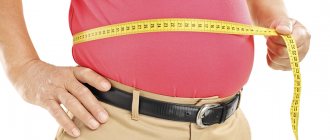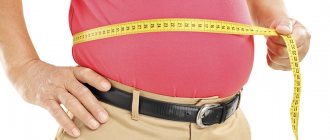All people need food. After all, a person receives energy from it. For the full functioning of the whole body, a balanced diet is required, during which the body receives a sufficient concentration of lipids, proteins and carbohydrates, minerals, vitamins and other useful components found in foods. How many calories a man should consume per day depends on many factors. These include physical activity, which allows you to quickly expend the calories received, the age of the man, since metabolic processes slow down over the years, etc.
Get out your calculator and we'll do the math.
Still from the movie "Guys with Guns"
The norm of calories per day for a man is one of those parameters that need to be monitored not only by those who are going to lose weight, but also by those who want to gain muscle mass.
And although the word “calories” is constantly heard, can you say for sure what it is and what they are needed for? And will a simple reduction in calories per day help men get rid of extra pounds?
But this is only the beginning of the list of questions that involuntarily arise immediately after you start thinking about this topic. Don't panic, we already have the answers! All you have to do is get to know them.
What are calories and what role do they play?
Before we start counting, let's refresh our memory about what they are - calories. This term refers to a unit of energy measurement. When you hear that something has 100 calories, it's a way of describing how much energy your body can get from that food or drink.
The body needs calories not only to perform various activities, but also for literally everything: for the functioning of internal organs and even sleep (although it requires a very small amount of calories).
Some foods, such as lettuce, are low in calories (less than 10 calories per serving). Other foods, such as peanuts, are high in calories (a half cup contains more than 400 calories). On the Internet you can easily find visual tables with the kcal content of food products that interest you.
If you take in more calories than you need, the body turns those extra calories into fat. However, only a doctor can tell whether you are overweight, so consult a specialist if you are concerned.
And never go on a diet without talking to your doctor first!
Calories: what is important to know about them?
Food is a source of energy for every person. This energy is expressed in kilojoules (kJ). Almost all products have food (energy) value, that is, their nutritional value is indicated in this measure. It is difficult for people far from physics to understand this. This is why calories (kcal) are used to indicate nutritional value.
To count calories correctly, remember the following: 1 g of fat = 9 kcal, 1 g of protein and carbohydrates = 4 kcal.
Calculations should be made based on the norm:
- Protein averages 65–70 g.
- Fats average 70–80 g.
- Carbohydrates are on average 280–360.
Each product contains its own caloric intake. The absorption of different substances also occurs in different ways. Carbohydrates are divided into fast and slow, the absorption of which requires greater amounts of energy than the former. For this reason, the body receives more benefits from them. But how to decide on the quantity?
To find out how much energy a particular person needs, you need to know how he uses energy. Those who lead an active life, playing sports, also spend energy actively. It is also important to take age into account - young people need more energy than older people.
How many calories should a man consume per day?
This figure depends on several factors, the main ones being:
- floor;
- age;
- activity level (high, moderately active or sedentary lifestyle).
The figures we present below were recommended by the Institute of Medicine of the National Academies of the United States in 1997, and they are calculated for people of average weight and height, so we emphasize that these are approximate figures.
At the age of 19 to 30 years, experts advise taking as the norm:
- sedentary guy - 2,400 kcal;
- moderately active - 2,600-2,800 kcal;
- leading an active lifestyle - 3,000 kcal.
At the age of 31-50 years it is recommended:
- sedentary man - 2,200 kcal;
- moderately active - 2,400-2,600 kcal;
- leading an active lifestyle - 2,800-3,000 kcal.
After 51 years, you should consume:
- sedentary man - 2,000 kcal;
- moderately active - 2,400 kcal;
- leading an active lifestyle - 2,400-2,800 kcal.
So, what conclusions can we draw from this table? Firstly, the number of calories should not exceed three thousand. And secondly, with age, the number of calories needed decreases.
The fact is that over time, our metabolism slows down and we need less food (energy) to fuel our bodies. In addition, your metabolism may slow down due to decreased muscle mass or a change in lifestyle towards a less active one.
Calorie calculators
Calorie needs calculator:
| Your age | 0-3 months 4-6 months 7-12 months 1-3 years 4-6 years 6 years (schoolchild) 7-10 years 11-13 years 14-17 years 18-29 years 30-39 years 40-59 years 60-74 years over 75 years |
| Floor: | Male Female pregnant: yes nursing (1-6 months) nursing (7-12 months) pregnant: no Your weight in kg. |
| Your physical activity | light physical activity light physical activity moderate physical activity high physical activity very high physical activity |
Calorie burn calculator:
| Activity: | Housework Light cleaning Cooking Conversation while eating Talking on the phone Making the bed Shopping for groceries Chit vacuuming carpets Washing windows Cleaning plumbing Cleaning glass, mirrors Knitting Sweeping Washing dishes Eating Writing while sitting Wiping dust Ironing clothes Hand sewing Reading out loud Reading loudly Typing keyboard at a fast pace Singing Sleep Lying awake Sitting Standing Climbing stairs/step Shopping Personal hygiene Taking a shower Taking a bath Hair styling Dressing and undressing Playing cards Playing board games Riding in cars (passenger) Riding a motorcycle Driving a car Sex active Sex ( passive) French kiss Light kiss Striptease Building snowmen, playing with snow Walking with the family Sitting with a child on your lap Playing with a child while sitting Feeding and dressing a child Bathing a child Carrying small children in your arms Walking with a stroller Walking with children in the park Playing with a child (high) activity) Playing with children with walking and running Playing with a child (moderate activity) Walking with the dog Fishing Playing the guitar while sitting Playing the guitar while standing Playing the piano Classroom classes, lesson Flying on an airplane Office work Working in the garden Weeding Pulling last year's grass Weeding new weeds Mowing the lawn Working as a massage therapist Medium-intensity exercise Figure skating Gymnastics class (light) Gymnastics class (energetic) Ballet class Fast dancing Disco dancing Slow dancing (waltz, tango) Ballroom dancing Modern dancing Running up the steps Cross-country running Running up and down steps Running, 10.4 km/h Running, 12 km/h Running, 16 km/h Slow running, 8 km/h Slow swimming Slow crawl Swimming Slow breaststroke Aqua aerobics Field hockey Mountaineering Aerobics Badminton Basketball Bowling Cycling, 16 km/h Walking, 4 km/h Walking, 6 km/h Uphill walking (15% incline, 3.8 km/h) Skiing Sports walking Digging Elliptical exercise Football Football , attack Golf Gymnastics Hockey Fencing Handball Horseback riding trotting Judo Slow rowing Sports rowing Ice skating Roller skating Flat skiing Downhill skiing Jumping rope Stretching Table tennis Tennis Volleyball Weight training Ashtanga yoga Static yoga Theoretical teaching Diving Water skiing |
| Duration of activity: | min. |
| Your weight: | kg. |
| Calories expended |
Daily calorie intake for a man who wants to gain weight
If you want to gain muscle mass, then it is logical to assume that you need more calories. But there are several nuances here.
According to the American Council on Exercise, increasing caloric intake by 500 to 1,000 calories per day should result in a positive energy balance and help a person increase their body weight by about a pound per week. But whether he gains fat or muscle will depend on his exercise habits and the macronutrients he consumes.
To gain muscle rather than fat, you should focus on eating more protein and less processed foods (any food that is highly processed) with added sugar, and limiting your intake of refined carbohydrates. And, of course, don’t forget about regular training!
To gain weight, a man should consume per day:
- 20 year old - 3200 kcal;
- 30-year-old - 3123 kcal;
- 40-year-old - 3045 kcal;
- 50 year old - 2968 kcal.
Why do you need to know your normal level?
If you start consuming more high-calorie foods than the norm, the body begins to immediately react to this by changing the external parameters of the body. Unspent calories begin to transform into fat deposits, during which the brutal relief of the male body begins to gradually become swollen with fat.
Video
Moreover, frequent overeating can negatively affect the condition of all organs of the digestive system, and the development of obesity can lead to serious pathologies of the heart, kidneys and liver. Do not forget that frequent fasting also has a negative impact on a person’s overall well-being.
Please note: A correctly established norm of kcal consumption per day for men will help maintain athletic shape, beautiful body contour, as well as organize proper nutrition, which will not interfere with playing sports and feeling at the highest level.
With a sharp reduction in the number of calories consumed, “panic reactions” occur in the body. The result of such actions may be a decrease in the volume of muscle fibers, rather than fat deposits, which can cover all the brutal features of the male body. Moreover, a tireless feeling of lethargy and irritability appears.
How many calories does a man who wants to lose weight need per day?
Now let's see how the recommended numbers change for those who want to lose a few kilos, depending on the person's activity and age.
If you are overweight, it is recommended to consume per day:
- a sedentary 20-year-old man—1,808 calories;
- a moderately active 20-year-old man: 2,481 calories;
- a sedentary 30-year-old man—1,748 calories;
- a moderately active 30-year-old man: 2,404 calories;
- a sedentary 40-year-old man—1,688 calories;
- a moderately active 40-year-old man: 2,326 calories;
- a sedentary 50-year-old man—1,628 calories;
- For a moderately active 50-year-old man, 2,249 calories.
What you need to know about kcal and why you need them
Food is an integral element that no one can do without. At the same time, you need to consume a certain amount of foods that will fill the body with the necessary substances and also provide the necessary energy for a man’s activities.
The energy obtained from food products is measured in kcal. On the label of any of them you can see a column in the nutritional value table, which indicates the number of calories per 100 g. Depending on what product is consumed, the minimum calories that the body will receive will be different. At the same time, it is also worth paying attention to other elements that an adult man should consume every day. These include proteins, fats and carbohydrates. The latter, in turn, can be of various types.
Simple carbohydrates are absorbed quickly. Slow carbohydrates have a more complex digestion process, which requires significantly more calories. This makes them more useful and significant for the male body. Calorie intake for men when losing weight is not the same for everyone. To get the most effective result, you need to calculate your individual indicator, for example, using our calculator, which is given below.
How to cut calories and not feel hungry: 3 tips
Simply starting to eat less is not the most effective way to lose weight. By sharply and significantly reducing portion sizes and the number of meals, you may experience a loss of energy, worsening mood and a constant feeling of hunger, which can ultimately trigger a “breakdown” and refusal of the diet.
Therefore, instead of a hunger strike, we advise you to pay attention not only to how much you eat, but also what exactly. And also use these three simple tips.
Eat more protein
The University of Maastricht in the Netherlands conducted a study, the results of which suggest that protein simultaneously speeds up metabolism and reduces appetite. The fact is that this element requires significant energy consumption for absorption, so a high-protein diet can increase calorie consumption by 80-100 kcal per day.
Another study conducted by the University of Missouri found that when protein made up 25% of daily calories, it reduced obsessive thoughts about food by 60% in 27 overweight men aged 44 to 50 and reduced the desire to snack late at night by 60%. 50% .
Avoid (or at least reduce your consumption of) sugary soft drinks
Another relatively easy dietary change you can make to lower your calorie count without making yourself faint is to eliminate liquid sugar calories from your diet. Namely, carbonated drinks, fruit juices (they are healthy, but only natural and in moderation), chocolate milk and other drinks with added sugar.
Drink more water
Research from the Humboldt University of Berlin showed that drinking 500 ml of water increased the metabolic rate by 30%, and this increase occurred within 10 minutes and reached a maximum after 30-40 minutes.
A 12-week study conducted by Virginia Tech's Department of Human Nutrition, Food and Exercise Science found that drinking half a liter of water half an hour before meals caused people to lose 44% more weight.
Basic formulas for calculating calorie intake
There are 2 most effective formulas:
- mifflin san geor formula;
- Charis benedict formula.
The formula according to Haris Benedict was developed in 1919, then it was slightly modified, and an updated version is currently being proposed for calculations. But the most popular is the Mifflin San Geor formula, thanks to which it is somewhat easier to calculate calorie content than according to Benedict. To calculate the daily calorie intake, you first need to measure your height and weight parameters, and then use the table presented to determine the physical activity coefficient:
| Determination of the level of physical activity coefficient in men | |
| Physical activity | Coefficient indicator |
| Passive lifestyle | 1,2 |
| Regular exercise at least 3 times a week | 1,375 |
| Workout at least 5 times a week | 1,4625 |
| Physical labor + intense sports | 1,55 |
| Daily exercise | 1,6375 |
| Several intense exercise sessions per day | 1,725 |
| Several intense workouts a day + physical labor | 1,9 |
Formula according to Harris Benedict
Benedict's formula is as follows: (88.36 + 13.4 * weight in kg + 4.8 * height in cm – 5.7 * age) * CFA.
Video
Where KFA is the coefficient of physical activity. Let's consider this formula using a specific example of calculating kcal for a 35-year-old man, 178 cm tall, weighing 80 kg, leading a passive lifestyle: (88.36+13.4*80+4.8*178-5.7*35)* 1.2 = 2178.312 - this will be his daily level of required calories.
Formula according to Mifflin San Geore
The formula itself is as follows: (10 * weight in kg + 6.25 * height in cm – 5 * age + 5) * CFA. Let's look at it using the same man as an example: (10*80+6.25*178-5*35+5)*1.2=2091, as can be seen from the results obtained, there is practically no difference. Therefore, in order to calculate the daily level of calorie consumption, you can use any of the presented formulas. And in order not to have to worry about making calculations and get faster results, you can use our online calculator.
Top 3 Calorie Counting Apps
So, we told you about how many calories a man needs per day. The only thing left to do is check how well your diet corresponds to these indicators.
Fortunately, counting calories is very easy these days, and you don't need to get any special notebooks or get out an abacus. There are many useful calculator websites and apps that can help you track your calorie intake.
Here are a few of them. All are available online and have apps for iPhone, iPad and Android, and registration takes less than a minute. Last but not least, they are free (but have premium versions).
MyFitnessPal
MyFitnessPal is one of the most popular calorie counters that tracks your weight and calculates your recommended daily calorie intake. It also has a well-designed food diary and exercise log.
The nutrition database in this app is very extensive and contains over five million foods. You can also download recipes from the Internet or add your own products and dishes.
Lose It!
If your English is very well, you can try this app, which includes an easy-to-use food diary and workout log. You can also sync it with a pedometer or other fitness device.
The role of calories in human life
We have found out how many calories a man needs per day. Let's find out what calories are and why the body needs them? Previously, rarely did anyone think about what a calorie is and what its “mission” is. But in the modern world, when not only women, but also men strive for a slim body, being interested in the process of losing weight, the question is quite relevant.
A calorie is equivalent to the energy that the body receives from food. When eating food, a person receives calories, which provide an energy supply for the normal functionality of all organs and systems, and they also lead to weight gain.
It’s worth knowing: a calorie is a unit of energy that is formed when a certain food product is digested. On food packaging they are indicated in kilocalories or joules.
After consuming any food, the body begins to expend the energy received as the food is transformed into nutrients for the body. If the body does not have time to burn them, for example, against the background of sports activity or heavy physical work, then the calories are deposited in the form of subcutaneous fat on the abdomen, thighs, etc.
The stronger sex should eat at least three times a day, dividing these meals by calorie content depending on their norm. The daily diet should contain a balance of B/F/U:
Recommended reading:
- Carbohydrates are needed in large quantities, since they are the main sources of energy reserves. The male body should receive 60% of carbohydrates per day from the total amount of useful components. Adequate carbohydrate intake is essential for normal functioning of the kidneys, brain and central nervous system;
- Proteins are a building element. A man should consume at least 10% per day, ideally closer to 30% of the total diet. They maintain immune status, help preserve muscle mass, and take part in the regeneration of damaged tissues;
- Lipids take part in the work of all organs and systems without exception. They protect internal organs from damage. The daily rate is up to 30%. If you completely abandon this component, the man loses vitality.
How many calories a man needs per day is quite easy to calculate. There are various formulas that facilitate this process.









